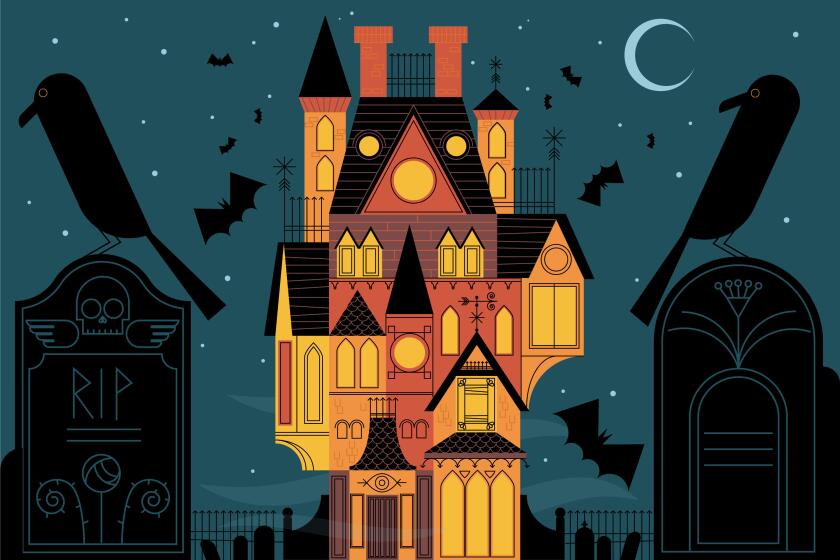HULA BOWL : Expatriates of Hawaii Gather for Island Fun, Food and Games at Eagle Rock Bowling Alley on Friday Nights
Sandy beaches, volcanoes and pineapple plants are scarce in Eagle Rock. But the Hawaii expatriates who gather Friday nights at the All-Star Bowling Lanes on Eagle Rock Boulevard don’t seem to mind.
They come to dance the hula, socialize with friends, eat their favorite island food at the adjacent coffee shop and oh, yes, bowl a few games.
“It’s something I look forward to every Friday night--getting together with my people. When I go back there, I feel like I’m going right back to my homeland,” said Lani Ua, a longtime member of the Aikane Bowling Club, one of the oldest Hawaiian clubs in California.
Although many of the club’s 175 members live in Northeast Los Angeles, others come from as far away as the San Fernando Valley and Monterey Park.
Ua, who drives in each week from Arleta, said that bowling provides a good excuse to throw a party.
“It doesn’t matter whether you bowl a 99 or 299,” she said.
A “Bowling-for-Dollars” crowd this is not. One recent Friday night, children playing tag dodged through players and onlookers. A well-mannered family ate an early dinner in the coffee shop. Groups of women clustered at tables above the bowling area, talking about their homeland.
One who came to watch, not bowl, was Bobby Chun of North Hollywood. Chun publishes Voice of Hawaii, a North Hollywood-based newspaper for expatriates that circulates among 7,200 subscribers in 30 states.
A boisterous man who favors sandals and island-print shirts, Chun said the Friday night ritual in Eagle Rock “is very important for us. We’re very social and we like to get together and have a good time.”
Chun’s monthly newspaper tips readers off about cheap airfares to the Islands, discusses the pros and cons of legal restitution for “native Hawaiians” thrown off their land by early colonists and lists most of the Southland’s Hawaiian cultural events.
Ads include those for Hawaiian businesses from restaurants to dentists as well as the “Malihinis,” a Polynesian dance troupe that entertains at private parties and offers lessons at the Encino Community Center.
Aikane (pronounced eye-con-eh) means “friend to all.” The club was founded in 1961 when George Yamamura and 11 other former Hawaii residents began meeting Fridays at Rodeo Bowl in Los Angeles to drink, bowl a few games and catch up on one another’s lives.
In the early 1960s, club members met at a now-closed bowling alley in Los Feliz managed by Fred Caluya, a slight man with a ready sense of humor and a raspy laugh. About 17 years ago, Caluya moved to All-Star Lanes and the Aikane Club migrated with him.
Bowling prowess comes second to camaraderie, but the club has rules and bylaws. Membership is restricted to those of native Hawaiian ancestry, former residents of Hawaii or people who are married to a Hawaiian or former resident of the islands.
In addition, “We’re allowed one haole per team,” joked Aikane secretary Linda Nugal, using a Hawaiian word that usually refers to Caucasians.
Mainland Is Home Now
Most members said they left Hawaii because job opportunities were better here. Many have raised families on the mainland.
“The last time I went home was 1979,” said Nugal, an Aikane member since 1965. “My kids were born and raised here. This is now where I belong.”
About 100,000 former Hawaii residents live in California, publisher Chun said. In Southern California, about 800 have joined one of four island bowling and social clubs scattered from Orange County to San Gabriel, he said.
Between knocking down pins, club members pass on their cultural heritage to their children.
Ua, an expert hula dancer originally from Honolulu, often gives lessons in the bowling alley’s lounge to classes of 20 or more.
The club also sponsors other events, such as an annual beauty contest to pick a “Miss Aikane,” and raises funds for members in need.
Its most popular event, however, is an annual May luau. Last year, the club’s 25th anniversary, the luau drew 1,300 people to the Glendale Civic Auditorium, Caluya said. This year, the luau is scheduled for May 9 at the Los Angeles Breakfast Club in Atwater.
Caluya said Fridays at All-Star Lanes are twice as busy as other nights, thanks to the Hawaii entourage and a band that plays Hawaiian and country-Western music in the lounge. By about 8:30 p.m., cars in the lot are double- and triple-parked.
Members wear bright-red shirts with the Aikane logo--a bowling ball adorned with a straw hat and lei.
Club members usually bowl from about 9 p.m. to 12:30 a.m., then gather in the lounge or the coffee shop. The socializing sometimes lasts until 4 or 5 in the morning.
At the coffee shop, which serves Hawaiian and Oriental food, Tula Ta’a and his wife, JoAnn, dish up island delicacies.
The food includes poi, a purple-gray paste made from the root of taro plants; lau lau, pork wrapped in steamed taro leaves, and aku, a type of tuna served raw in a tangy sauce.
Ta’a said the taro root and leaves and the aku are flown in from Hawaii. The rest is purchased locally.
And for die-hards, the coffee shop provides scallions that islanders traditionally dip in rock salt and eat with their meal.
If patrons want to compliment the chef, they tell him that the food was so good it “broke da mouth.”
Long after midnight on Fridays, when much of Eagle Rock is asleep, the former residents of Hawaii can be found at All-Star Lanes eating food that breaks the mouth and toasting each other with okole maluna, or “bottoms up.”
Sign up for The Wild
We’ll help you find the best places to hike, bike and run, as well as the perfect silent spots for meditation and yoga.
You may occasionally receive promotional content from the Los Angeles Times.



